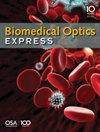SODL-IR-FISTA: sparse online dictionary learning with iterative reduction FISTA for cone-beam X-ray luminescence computed tomography.
IF 2.9
2区 医学
Q2 BIOCHEMICAL RESEARCH METHODS
引用次数: 0
Abstract
Cone beam X-ray luminescence computed tomography (CB-XLCT) is an emerging imaging technique with potential for early 3D tumor detection. However, the reconstruction challenge due to low light absorption and high scattering in tissues makes it a difficult inverse problem. In this study, the online dictionary learning (ODL) method, combined with iterative reduction FISTA (IR-FISTA), has been utilized to achieve high-quality reconstruction. Our method integrates IR-FISTA for efficient and accurate sparse coding, followed by an online stochastic approximation for dictionary updates, effectively capturing the sparse features inherent to the problem. Additionally, a re-sparse step is introduced to enhance the sparsity of the solution, making it better suited for CB-XLCT reconstruction. Numerical simulations and in vivo experiments were conducted to assess the performance of the method. The SODL-IR-FISTA achieved the smallest location error of 0.325 mm in in vivo experiments, which is 58% and 45% of the IVTCG-L 1 (0.562 mm) and OMP-L 0 (0.721 mm), respectively. Additionally, it has the highest DICE similarity coefficient, which is 0.748. The results demonstrate that our approach outperforms traditional methods in terms of localization precision, shape restoration, robustness, and practicality in live subjects.SODL-IR-FISTA:用于锥束 X 射线发光计算机断层扫描的稀疏在线词典学习与迭代还原 FISTA。
锥形束 X 射线发光计算机断层扫描(CB-XLCT)是一种新兴的成像技术,具有早期三维肿瘤检测的潜力。然而,由于组织对光的吸收率低、散射率高,导致重建困难,使其成为一个难以解决的逆问题。本研究利用在线字典学习(ODL)方法,结合迭代还原 FISTA(IR-FISTA),实现了高质量的重建。我们的方法集成了 IR-FISTA 以实现高效、准确的稀疏编码,然后采用在线随机近似进行字典更新,从而有效捕捉问题的固有稀疏特征。此外,该方法还引入了重新稀疏步骤,以增强解决方案的稀疏性,使其更适合 CB-XLCT 重建。为了评估该方法的性能,我们进行了数值模拟和活体实验。在活体实验中,SODL-IR-FISTA 的定位误差最小,为 0.325 毫米,分别是 IVTCG-L 1(0.562 毫米)和 OMP-L 0(0.721 毫米)的 58% 和 45%。此外,它的 DICE 相似系数最高,达到 0.748。结果表明,我们的方法在定位精度、形状还原、鲁棒性和活体实用性方面都优于传统方法。
本文章由计算机程序翻译,如有差异,请以英文原文为准。
求助全文
约1分钟内获得全文
求助全文
来源期刊

Biomedical optics express
BIOCHEMICAL RESEARCH METHODS-OPTICS
CiteScore
6.80
自引率
11.80%
发文量
633
审稿时长
1 months
期刊介绍:
The journal''s scope encompasses fundamental research, technology development, biomedical studies and clinical applications. BOEx focuses on the leading edge topics in the field, including:
Tissue optics and spectroscopy
Novel microscopies
Optical coherence tomography
Diffuse and fluorescence tomography
Photoacoustic and multimodal imaging
Molecular imaging and therapies
Nanophotonic biosensing
Optical biophysics/photobiology
Microfluidic optical devices
Vision research.
 求助内容:
求助内容: 应助结果提醒方式:
应助结果提醒方式:


